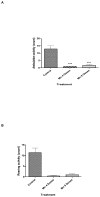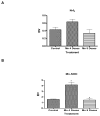The inhibitory effect of manganese on acetylcholinesterase activity enhances oxidative stress and neuroinflammation in the rat brain
- PMID: 22154916
- PMCID: PMC3264815
- DOI: 10.1016/j.tox.2011.11.017
The inhibitory effect of manganese on acetylcholinesterase activity enhances oxidative stress and neuroinflammation in the rat brain
Abstract
Background: Manganese (Mn) is a naturally occurring element and an essential nutrient for humans and animals. However, exposure to high levels of Mn may cause neurotoxic effects. The pathological mechanisms associated with Mn neurotoxicity are poorly understood, but several reports have established it is mediated, at least in part, by oxidative stress.
Objectives: The present study was undertaken to test the hypothesis that a decrease in acetylcholinesterase (AChE) activity mediates Mn-induced neurotoxicity.
Methods: Groups of 6 rats received 4 or 8 intraperitoneal (i.p.) injections of 25mg MnCl(2)/kg/day, every 48 h. Twenty-four hours after the last injection, brain AChE activity and the levels of F(2)-isoprostanes (F(2)-IsoPs) and F(4)-neuroprostanes (F(4)-NPs) (biomarkers of oxidative stress), as well as prostaglandin E(2) (PGE(2)) (biomarker of neuroinflammation) were analyzed.
Results: The results showed that after either 4 or 8 Mn doses, brain AChE activity was significantly decreased (p<0.05), to 60 ± 16% and 55 ± 13% of control levels, respectively. Both treated groups exhibited clear signs of neurobehavioral toxicity, characterized by a significant (p<0.001) decrease in ambulation and rearings in open-field. Furthermore, Mn treatment caused a significant increase (p<0.05) in brain F(2)-IsoPs and PGE(2) levels, but only after 8 doses. In rats treated with 4 Mn doses, a significant increase (p<0.05) in brain F(4)-NPs levels was found. To evaluate cellular responses to oxidative stress, we assessed brain nuclear factor-erythroid 2 p45-related factor 2 (Nrf2) and Mn-superoxide dismutase (Mn-SOD, SOD2) protein expression levels. A significant increase in Mn-SOD protein expression (p<0.05) and a trend towards increased Nrf2 protein expression was noted in rat brains after 4 Mn doses vs. the control group, but the expression of these proteins was decreased after 8 Mn doses. Taken together, these results suggest that the inhibitory effect of Mn on AChE activity promotes increased levels of neuronal oxidative stress and neuroinflammatory biomarkers.
Copyright © 2011 Elsevier Ireland Ltd. All rights reserved.
Conflict of interest statement
None of the authors has any financial interest or conflict of interest related to the manuscript.
Figures
Comment in
-
Comments to the Editor concerning the cholinergic response to manganese-induced neurotoxicity, based on the paper entitled "The inhibitory effect of manganese on acetylcholinesterase activity enhances oxidative stress and neuroinflammation in the brain" by Santos et al.Toxicology. 2012 Aug 16;298(1-3):59-60; author reply 61-2. doi: 10.1016/j.tox.2012.03.010. Epub 2012 Apr 6. Toxicology. 2012. PMID: 22503707 No abstract available.
References
-
- Ali S, Duhart H, Newport G, Lipe G, Slikker W. Manganese-induced reactive oxygen species: comparison between Mn+2 and Mn+3. Neurodegeneration. 1995;4(3):329–334. - PubMed
-
- Arneson K, Roberts J. Measurement of products of docosahexaenoic acid peroxidation, neuroprostanes, and neurofurans. Methods Enzymol. 2007;433:127–143. - PubMed
-
- Aschner M, Gannon M. Manganese (Mn) transport across the rat blood-brain barrier: saturable and transferring-dependent transport mechanisms. Brain Res Bull. 1994;33(3):345–349. - PubMed
-
- Aschner M, Erikson K, Dorman D. Manganese dosimetry: species differences and implications for neurotoxicity. Crit Rev Toxicol. 2005;35:1–32. - PubMed
Publication types
MeSH terms
Substances
Grants and funding
LinkOut - more resources
Full Text Sources
Medical









